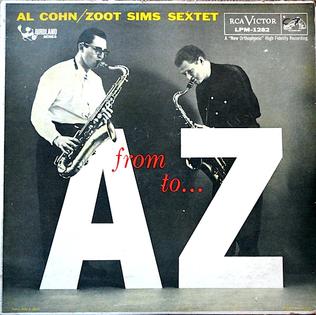
Theodore "Fats" Navarro was an American jazz trumpet player. He was a pioneer of the bebop style of jazz improvisation in the 1940s. He had a strong stylistic influence on many other players, including Clifford Brown.

Red Norvo was an American musician, one of jazz's early vibraphonists, known as "Mr. Swing". He helped establish the xylophone, marimba, and vibraphone as jazz instruments. His recordings included "Dance of the Octopus", "Bughouse", "Knockin' on Wood", "Congo Blues", and "Hole in the Wall".

Benjamin Francis Webster was an American jazz tenor saxophonist.

Bluebird Records is a record label best known for its low-cost releases, primarily of kids' music, blues and jazz in the 1930s and 1940s. It was founded in 1932 as a lower-priced RCA Victor subsidiary label of RCA Victor. Bluebird became known for what came to be known as the "Bluebird sound", which influenced rhythm and blues and early rock and roll. It is currently owned by parent company Sony Music Entertainment.
"Blues in the Night" is a popular blues song which has become a pop standard and is generally considered to be part of the Great American Songbook. The music was written by Harold Arlen, the lyrics by Johnny Mercer, for a 1941 film begun with the working title Hot Nocturne, but finally released as Blues in the Night. The song is sung in the film by William Gillespie.

The Blanton–Webster Band is a compilation album that combines the master takes of all the recordings by Duke Ellington's Orchestra during the years of 1940 to 1942, involving bassist Jimmy Blanton and tenor saxophonist Ben Webster. The recordings were originally made for RCA Victor during what many critics regard as the Ellington orchestra's golden period. The three CDs contain many numbers which were to become classics, and the arrangements were frequently inventive and innovative.

"Baby, Please Don't Go" is a traditional blues song that was popularized by Delta blues musician Big Joe Williams in 1935. Many cover versions followed, leading to its description as "one of the most played, arranged, and rearranged pieces in blues history" by French music historian Gérard Herzhaft.
The Four Lovers was a band formed in 1956 that was the result of vocalist Frankie Valli joining The Variatones in 1954. The Four Lovers achieved minor success before a name change to The Four Seasons in 1960. During those five years, group members also included Nicolas DeVito, Hugh Garrity, Charles Calello (bass), Nick Massi, Bob Gaudio, and Philip Mongiovi (drums)
"A Garden in the Rain" is a popular song. The music was composed by Carroll Gibbons, the lyrics by James Dyrenforth. The song was published in 1928. The song was first recorded by the composer, Carroll Gibbons with the Savoy Hotel Orpheans and vocals by George Metaxa, in July 1928.
Edward Durham was an American jazz guitarist, trombonist, composer, and arranger. He was one of the pioneers of the electric guitar in jazz. The orchestras of Bennie Moten, Jimmie Lunceford, Count Basie, and Glenn Miller took great benefit from his composing and arranging skill.
Seldon Powell was an American soul jazz, swing, and R&B tenor saxophonist and flautist born in Lawrenceville, Virginia.
"That's My Desire" is a 1931 popular song with music by Helmy Kresa and lyrics by Carroll Loveday.

"You Must Have Been a Beautiful Baby" is a popular song with music by Harry Warren and lyrics by Johnny Mercer, written in 1938 for the Warner Brothers movie Hard to Get, released November 1938, in which it was sung by Dick Powell.

Joseph Barry Galbraith was an American jazz guitarist.
For music from an individual year in the 1940s, go to 40 | 41 | 42 | 43 | 44 | 45 | 46 | 47 | 48 | 49

The Smithsonian Collection of Classic Jazz is a six-LP box set released in 1973 by the Smithsonian Institution. Compiled by jazz critic, scholar, and historian Martin Williams, the album included tracks from over a dozen record labels spanning several decades and genres of American jazz, from ragtime and big band to post-bop and free jazz.
"My Bucket's Got a Hole in It" is a song widely attributed to Clarence Williams, who obtained a copyright in 1933, although the melody was recorded under various names years earlier. The song became popular performed by Hank Williams for MGM and reached number 4 on the country chart in 1949.

This is a discography of the Carter Family - Sara Carter, her husband A.P. Carter, and their sister-in-law Maybelle Carter - often cited as "the most influential group in country music history":

From A to...Z is an album by the Al Cohn/Zoot Sims Sextet recorded in early 1956 for the RCA Victor label.
"My Greatest Mistake" is a popular song written in 1940 by Jack Fulton and Jack "Bones" O'Brien.











